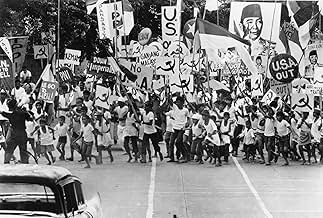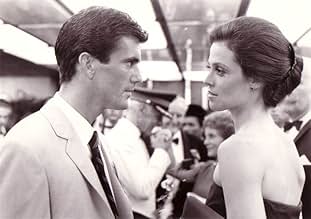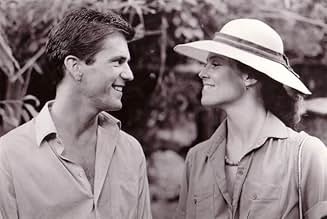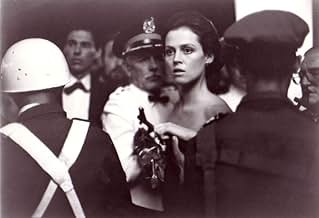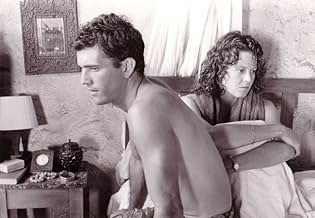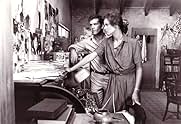AVALIAÇÃO DA IMDb
7,1/10
24 mil
SUA AVALIAÇÃO
Um jovem repórter australiano tenta navegar na turbulência política da Indonésia durante o governo do presidente Sukarno com a ajuda de um pequeno fotógrafo.Um jovem repórter australiano tenta navegar na turbulência política da Indonésia durante o governo do presidente Sukarno com a ajuda de um pequeno fotógrafo.Um jovem repórter australiano tenta navegar na turbulência política da Indonésia durante o governo do presidente Sukarno com a ajuda de um pequeno fotógrafo.
- Direção
- Roteiristas
- Artistas
- Ganhou 1 Oscar
- 10 vitórias e 14 indicações no total
Avaliações em destaque
I am a little amazed that, so far, only 40 comments have been entered. Fortunately most are of high quality, and all the important points related to the film are clearly highlighted. So, I will not repeat what has been well said by others. I want to explain one additional point, it has to do with my personal experience but might be interesting to mention.
I'm a professional expatriate, living overseas for 25 years. I'm not talking about an American in Paris or an Englishman in New York, I mean African steppes, tropical jungles, Indian slums. Living in a totally foreign country, in a totally strange culture, imperfectly understanding the local language, bewildered by alien logic, you experience a permanent sense of unease. You adapt, you learn to cope, you make what you hope are friends. But you never forget that you are a stranger in unknown territory, and that you are vulnerable.
You may peacefully walk on the street one minute, the next minute bullets are flying all around you. In the evening you have a pleasant drink with your neighbour, in the morning you are arrested, accused of being a foreign mercenary. When you travel inland you come at a road block, not knowing if they'll let you pass, or harass you for a couple of hours, or confiscate your car. As a foreigner in developing countries, you are constantly confronted with uncertainty, an intangible menace lurking around the corner.
I find that TYOLD transmits this sense of menace very poignantly. Many people have commented on its brilliant sense of place, the accurate depiction of Indonesia and the events that took place at the time. Others mention that you get a very real feeling of the tension and uncertainty journalists in times of upheaval are subjected to. But I would like to extend it beyond journalists. The sense of menace in TYOLD is eminently recognizable by all who have lived in countries where the police is not there to protect you, the laws are not there to make society more civilized, the hospitals are not there to cure you. In TYOLD, the menace is made visible because of the troubles that erupt, but usually you do not have to live through civil war when overseas. Still, the menace is not less real, and the sense of foreboding haunting every expatriate was very convincingly conveyed in the film.
I'm a professional expatriate, living overseas for 25 years. I'm not talking about an American in Paris or an Englishman in New York, I mean African steppes, tropical jungles, Indian slums. Living in a totally foreign country, in a totally strange culture, imperfectly understanding the local language, bewildered by alien logic, you experience a permanent sense of unease. You adapt, you learn to cope, you make what you hope are friends. But you never forget that you are a stranger in unknown territory, and that you are vulnerable.
You may peacefully walk on the street one minute, the next minute bullets are flying all around you. In the evening you have a pleasant drink with your neighbour, in the morning you are arrested, accused of being a foreign mercenary. When you travel inland you come at a road block, not knowing if they'll let you pass, or harass you for a couple of hours, or confiscate your car. As a foreigner in developing countries, you are constantly confronted with uncertainty, an intangible menace lurking around the corner.
I find that TYOLD transmits this sense of menace very poignantly. Many people have commented on its brilliant sense of place, the accurate depiction of Indonesia and the events that took place at the time. Others mention that you get a very real feeling of the tension and uncertainty journalists in times of upheaval are subjected to. But I would like to extend it beyond journalists. The sense of menace in TYOLD is eminently recognizable by all who have lived in countries where the police is not there to protect you, the laws are not there to make society more civilized, the hospitals are not there to cure you. In TYOLD, the menace is made visible because of the troubles that erupt, but usually you do not have to live through civil war when overseas. Still, the menace is not less real, and the sense of foreboding haunting every expatriate was very convincingly conveyed in the film.
It's 1965 Jakarta in Indonesia under the brutal rule of President Sukarno. Guy Hamilton (Mel Gibson) is on his first foreign assignment for the Australian Broadcasting Service. He is befriended by photographer half-Chinese dwarf Billy Kwan (Linda Hunt). There is an air of anti-western feeling. Guy is lost without connections until Billy starts helping him out. He has an affair with British diplomat Jill Bryant (Sigourney Weaver). It's a world of murky Cold War politics, secrets and trying morality.
This has a great exotic atmosphere. The movie has a sense of impending doom. Mel Gibson is terrific and shows his superior star power. Linda Hunt creates such a compelling character. It does need to heighten the tension a little. The plot meanders in this murky world. It needs a direction. Nevertheless I just love the dark exotic mood.
This has a great exotic atmosphere. The movie has a sense of impending doom. Mel Gibson is terrific and shows his superior star power. Linda Hunt creates such a compelling character. It does need to heighten the tension a little. The plot meanders in this murky world. It needs a direction. Nevertheless I just love the dark exotic mood.
This excellent movie is set in 1965 Indonesia, when an Australian reporter named Gay Hamilton is assigned on his first work as a foreign journalist. His apparently simple mission to Yakarta soon turns hot when he interviews a rebel leader , while President Sukarno was toppling by pressure left from communists and right from military. Guy soon is the hottest reporter with the help of his photographer, a native, half- Chinese midget named Kwan . Eventually Hamilton must confront moral conflicts and the relationship between Billy and him reaches some problems connected with a British diplomatic attaché , at the same time the political upheaval takes place in coup détat.
Mel Gibson is good as correspondent covering a conflict and finding himself becoming personally involved when he befriends a free-lance photographer named Billy Kwan and falling for a beautiful Embassy assistant, a mesmerizing Sigourney Weaver .The movie has its touching moments found primarily in the superb supporting performances as Michael Murphy as lively journalist , Bill Kerr as veteran Colonel and of course diminutive Linda Hunt who steals the show as sensible photographer in her Academy Award-winning character, a woman acting a man, and well deservedly prized. Moving and intimate musical score though composed by synthesizer by Maurice Jarre. Atmospheric cinematography that adequate as a mood-piece by Russell Boyd.
The motion picture is stunningly directed by Australian director Peter Weir who achieved several hits (Witness, Gallipoli, The last wave) and some flop (Mosquito coast, The plumber). The movie belongs to sub-genre that abounded in the 80s about reporters around the world covering dangerous political conflicts , such as Nicaragua in ¨Under fire¨ by Robert Spottswoode with Nick Nolte , Gene Hackman and Joanna Cassidy, Salvador in ¨Salvador¨ by Oliver Stone with James Woods and James Belushi, and Libano in ¨Deadline¨ by Nathaliel Gutman with Christopher Walken and Hywel Bennett. These movies are very much in the vein of ¨The year of living dangerously¨.
Mel Gibson is good as correspondent covering a conflict and finding himself becoming personally involved when he befriends a free-lance photographer named Billy Kwan and falling for a beautiful Embassy assistant, a mesmerizing Sigourney Weaver .The movie has its touching moments found primarily in the superb supporting performances as Michael Murphy as lively journalist , Bill Kerr as veteran Colonel and of course diminutive Linda Hunt who steals the show as sensible photographer in her Academy Award-winning character, a woman acting a man, and well deservedly prized. Moving and intimate musical score though composed by synthesizer by Maurice Jarre. Atmospheric cinematography that adequate as a mood-piece by Russell Boyd.
The motion picture is stunningly directed by Australian director Peter Weir who achieved several hits (Witness, Gallipoli, The last wave) and some flop (Mosquito coast, The plumber). The movie belongs to sub-genre that abounded in the 80s about reporters around the world covering dangerous political conflicts , such as Nicaragua in ¨Under fire¨ by Robert Spottswoode with Nick Nolte , Gene Hackman and Joanna Cassidy, Salvador in ¨Salvador¨ by Oliver Stone with James Woods and James Belushi, and Libano in ¨Deadline¨ by Nathaliel Gutman with Christopher Walken and Hywel Bennett. These movies are very much in the vein of ¨The year of living dangerously¨.
In "The Year of Living Dangerously" director Peter Weir attempts much and accomplishes most of his goals. It's a socio-political essay on the dangers of Western meddling in Third World countries. It's a fascinating view into the challenges of journalism in a volatile foreign country. It's a steamy romance involving two beautiful, intelligent characters. It's a distinctly Far Eastern morality play that seems to delight in yin/yang paradoxes. Plus it's one of the best films at evoking the mood, texture, and sensuality of life in Southeast Asia. Don't be too harsh on Weir for the lapses in historic accuracy and plotting, because it's a complicated, busy landscape he is painting here. The best things about the film are:
-Linda Hunt's amazing performance. Unlike other gender-bending performances (Julie Andrews in "Victor/Victoria", Dustin Hoffman in "Tootsie") you never once give any thought to the fact that this is a woman playing a man. It's a seamless transition and a performance of immense heart and honesty. The image of a distraught Billy pounding at his typewriter, pleading "What then must we do?" while an aria swells around him and the eyes of Jakarta's poor stare at him from his own photographs, is an incredibly moving scene.
-The atmosphere created by the combination of Russell Boyd's cinematography and Maurice Jarre's score. Take a look at the scene with Weaver walking through the streets of Jakarta in a tropical downpour. The effect is breathtaking.
-The chemistry between Gibson and Weaver. You can feel the heat between them. Unlike other posters here, I believe their romance is one of the film's strong points.
I agree that the ending is a bit of a letdown, but it doesn't diminish Weir's accomplishments. "The Year of Living Dangerously" is a startling unique film, and certainly one his best.
-Linda Hunt's amazing performance. Unlike other gender-bending performances (Julie Andrews in "Victor/Victoria", Dustin Hoffman in "Tootsie") you never once give any thought to the fact that this is a woman playing a man. It's a seamless transition and a performance of immense heart and honesty. The image of a distraught Billy pounding at his typewriter, pleading "What then must we do?" while an aria swells around him and the eyes of Jakarta's poor stare at him from his own photographs, is an incredibly moving scene.
-The atmosphere created by the combination of Russell Boyd's cinematography and Maurice Jarre's score. Take a look at the scene with Weaver walking through the streets of Jakarta in a tropical downpour. The effect is breathtaking.
-The chemistry between Gibson and Weaver. You can feel the heat between them. Unlike other posters here, I believe their romance is one of the film's strong points.
I agree that the ending is a bit of a letdown, but it doesn't diminish Weir's accomplishments. "The Year of Living Dangerously" is a startling unique film, and certainly one his best.
One of the most perfect movies ever made. A true slice of life - what art is supposed to be all about. The music is extraordinary - note how Jarre uses it (and I will say no more for fear of spoiling the effect). No, this wasn't filmed on location, but I don't think that should matter, as the ability of the film to evoke a place and a period is remarkable. I first saw this movie by chance; I have owned it ever since. It's one of these rare movies that are made as an artist is climbing upwards in career but not yet devoured by the commercial interests who will notice and try to effect a lucrative transformation.
Você sabia?
- CuriosidadesDirector Peter Weir cast Linda Hunt in the role of Billy Kwan after failing to find an actor who could play the part the way he wanted.
- Erros de gravaçãoBilly's still camera is a Nikon F2 Photomic, which was not released until 1971, while the film takes place in 1965.
- Citações
Billy Kwan: What then must we do? We must give with love to whoever God has placed in our path.
- ConexõesFeatured in Peter Weir Industry Seminar 1989 (1989)
- Trilhas sonorasBeim Schlafengehen
from "Four Last Songs"
by Richard Strauss
Performed by Kiri Te Kanawa and London Symphony Orchestra
Conducted by Andrew Davis
Courtesy of CBS Masterworks
Published by Boosey-Hawkes
Principais escolhas
Faça login para avaliar e ver a lista de recomendações personalizadas
- How long is The Year of Living Dangerously?Fornecido pela Alexa
Detalhes
- Data de lançamento
- Países de origem
- Idiomas
- Também conhecido como
- O Ano em que Vivemos em Perigo
- Locações de filme
- Empresas de produção
- Consulte mais créditos da empresa na IMDbPro
Bilheteria
- Orçamento
- US$ 13.000.000 (estimativa)
- Faturamento bruto nos EUA e Canadá
- US$ 10.278.575
- Fim de semana de estreia nos EUA e Canadá
- US$ 35.000
- 23 de jan. de 1983
- Faturamento bruto mundial
- US$ 10.278.575
Contribua para esta página
Sugerir uma alteração ou adicionar conteúdo ausente

